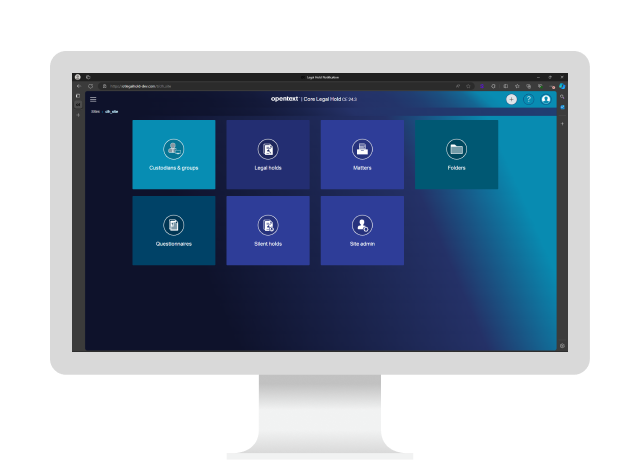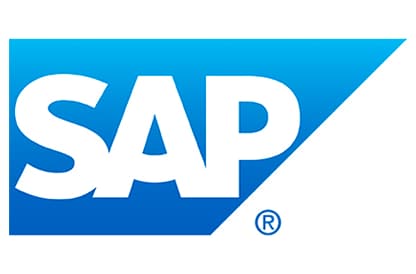OpenText Core Legal Hold
Automate legal holds to eliminate risky and time-consuming processes

Overview
Automate processes and reduce legal risk with OpenText™ Core Legal Hold. Use legal hold software to standardize tasks and quickly issue and track legal holds—eliminating spreadsheet chaos and creating a repeatable, defensible legal hold process.

Why OpenText Core Legal Hold?
Centralize legal hold management at a fraction of the cost of competitors’ legal hold software. Reduce complexity and mitigate risks associated with holds—such as evidence spoilation—and other data-preservation efforts.
- Rapid
Implementation made easy
Start benefitting in weeks, not months, by deploying in a multi-tenant SaaS cloud. - Seamless
Integrate with common systems
Create a reliable, precise, and automated workflow for managing custodian profiles and transforming employee change management. - Predictable
Achieve cost certainty
Leverage flat-fee subscriptions and reduce dependency on IT resources to manage legal hold software affordably and lower TCO.
Use cases
Eliminate inefficiencies and mitigate risk by using legal hold technology for all your legal matters—civil actions, regulatory requests, and internal investigations.
-
Use centralized legal hold technology to simplify end-to-end legal hold workflows allowing users to save time on manual or otherwise cumbersome processes.
-
Create and distribute hold notices in minutes, track acknowledgements, and schedule automated reminders to custodians.
-
Create and track web-based questionnaires with suggested expert questions to ensure key custodians identify and preserve relevant data sources and records.
-
Maintain precise reports and create audit trails to deliver real-time visibility into active holds, act on outstanding tasks, and demonstrate compliance.
Key features

Easy-to-use interface
Improves productivity with an intuitive interface and simplified user experience.

Configurable processes
Accommodates many different legal scenarios with wizard-style screens to quickly configure and customize workflows.

Automated legal hold notifications and reminders
Provides templates to issue and track legal hold notices and ensure that no acknowledgement goes missing—all with minimal manual effort.

In-place mailbox preservation
Mitigates the risk of spoliation by automating in-place preservation and prevents content duplication or movement in the process.

Up-to-date custodian profiles
Connects to data across enterprise systems to make custodian selection straightforward and keep custodian records accurate as roles or employment status change.

Legal hold dashboards
Makes it easy to check the status of employee legal holds and preservation obligations, either for a single hold or across multiple holds.

Role-based permissions
Controls access to legal holds and protects sensitive information by ensuring only authorized personnel can review and make changes.

Silent holds
Enables workflows to support data preservation activities without alerting custodians.
Integrations
OpenText Core Legal Hold easily integrates with enterprise systems to securely push or pull custodian data to or from the site. The legal hold tool synchronizes legal hold data with various systems to optimize interdepartmental activities.
Accelerate the value of OpenText Core Legal Hold
Deployment
OpenText offers deployment choice and flexibility for OpenText Core Legal Hold.
-
Run anywhere and scale globally in the public cloud of your choice
OpenText on public cloud
Professional Services
OpenText Professional Services combines end-to-end solution implementation with comprehensive technology services to help improve systems.
-
Get a trusted partner to guide your information management path
Your journey to success
-
Accelerate your information management journey
Consulting Services
-
Propel your business into the future with modern solutions
NextGen Services
-
Unlock the full potential of your information management solution
Customer Success Services
Partners
OpenText helps customers find the right solution, the right support, and the right outcome.
-
Search OpenText's Partner directory
Find a Partner
-
Explore OpenText's Partner solutions catalog
Application Marketplace
-
Industry-leading organizations that enhance OpenText products and solutions
Strategic Partners
Training
OpenText Learning Services offers comprehensive enablement and learning programs to accelerate knowledge and skills.
-
Meet the demands of all types of users for effective adoption
Learning Services
-
Unlimited access to training with personalized tiers to fit your needs
Learning Subscriptions
Communities
Explore our OpenText communities. Connect with individuals and companies to get insight and support. Get involved in the discussion.
-
Explore ideas, join discussions, and network
OpenText’s forums
Premium Support
Optimize the value of your OpenText solution with dedicated experts who provide mission-critical support for your complex IT environment.
OpenText Core Legal Hold resources
OpenText Core Legal Hold: Minimize risks and drive defensible legal hold and preservation activities
Read the product overview5 key steps to implement OpenText Core Legal Hold
Read the data sheetLegal holds without the headaches
Read the ebookOpenText Core Legal Hold: Minimize risks and drive defensible legal hold and preservation activities
Read the product overview5 key steps to implement OpenText Core Legal Hold
Read the data sheetLegal holds without the headaches
Read the ebook-
A legal hold, also known as a “litigation hold” supports a duty to preserve potentially relevant data. Once issued, organizations must suspend normal document retention and destruction policies to preserve all potentially relevant information.
-
A legal hold is triggered when litigation is reasonably anticipated, parties receive notice of potential claims or threats of legal action, internal or regulatory investigations commence, or efforts are needed to meet compliance obligations.
-
By implementing a legal hold, necessary steps are taken to ensure that evidence remains unaltered and available for scrutiny. Defensibility of the legal hold process is key for legal teams as it a way to verify that data was handled properly and preservation obligations were adhered to.
-
Failing to implement a proper litigation hold can have serious consequences. Courts may impose sanctions for spoliation (the destruction or alteration of evidence), which can include adverse inference instructions to juries, monetary penalties, or even default judgments in severe cases.
-
The legal hold process involves a series of steps to maintain compliance and minimize the risk of spoliation of evidence. Understanding these components helps organizations develop robust litigation hold procedures that meet legal requirements while minimizing disruption to business operations.
-
Legal hold software automates critical aspects of the preservation workflow and help legal departments and IT professionals centralize legal hold management, be more efficient and automate time-consuming and risky manual processes.
-
Legal hold software should help to create a repeatable, automated workflow. It should centralize end-to-end workflows and allow legal teams to convert time spent on manual, repetitive tasks, into productive, higher value work—reducing critical activities from hours or days to minutes.

Why in-place preservation is critical to the litigation hold process
Automate legal holds, manage custodians, and ease burdens on IT teams.
Read the blog
Ditch those spreadsheets when it comes to legal holds
Here’s how legal hold technology can eliminate manually intensive processes.
Read the blog
Take the next step





